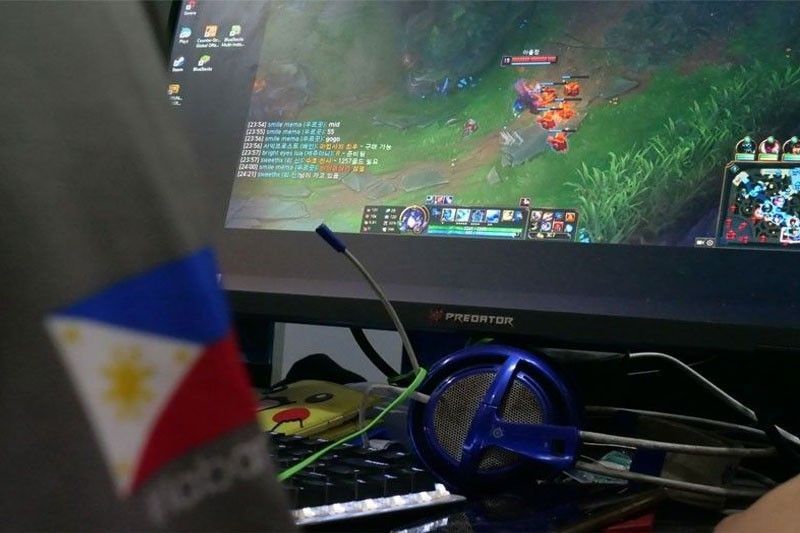Could esports make it as an Olympic sport?

MANILA, Philippines — Tokyo 2020 has certainly been an Olympics for the books. Being delayed a year due to the pandemic and with the almost-cancelation given the terrifying threat the Delta variant posed; the quadrennial multi-sport event has united countries across the globe as each supports their own.
For the Philippines, it was the best performance by the country’s contingent to date. Not only did Hidilyn Diaz give the country its first gold medal in the near-century of participating in the games but boxers Nesthy Petecio, Carlo Paalam and Eumir Marcial combined their prowess to propel the country to a four medal haul with two silvers and one bronze. This overtook the previous record of the Philippines of three bronze medals during the Los Angeles 1932 Games.
But could the medal tally be greater with an inclusion of an event that has been a hot topic of debate for the past few years?
Tokyo 2020 introduced (or reintroduced in the case of two) six new events to the delayed competition: Sports Climbing, Karate, Surfing, Skateboarding, and the return of Baseball and Softball events since its absence in the 2008 Beijing Olympics.
Notably absent is one event that would have made sense being introduced since Tokyo is home to many pioneers in the video games industry, esports.
Esports and video games have been something that the International Olympic Committee (IOC) has been considering venturing into. In the released Olympic Agenda 2020+5 last February of this year, the Executive Board (EB) of the IOC proposed different recommendations that are designed to strengthen the Olympic Movement by 2025.
One such recommendation was: Encourage the development of virtual sports and further engage with video gaming communities.
With the Olympic Agenda 2020+5, the IOC aims to assist International Sports Federations in developing virtual forms of their sport, hoping to engage the youth.
The IOC made this come to life prior to the Tokyo 2020 Olympics with its first Olympic Virtual Series (OVS). The inaugural OVS happened last May 13 to June 23 where players competed in virtual versions of Olympic events. The IOC partnered with International Sports Federations and game publishers showcasing the following events: Baseball, MotorSport, Sailing, Rowing and Cycling.
Going back to the Olympic Agenda, the IOC made sure to differentiate what they were visualizing with this recommendation. Though they focused on virtual sports, which are digital versions of the traditional sports featured in the Olympics, they are not turning a blind eye to competitive gaming.
“As elite esports and gaming competitors are relatively new to the highly competitive environment, they have more limited access to resources than athletes in traditional sports. The IOC recognizes these challenges and aims to adapt various existing tools and resources to support them in different fields such as gender equality, mental and physical health, competition integrity, and career transition.” stated the Olympic Agenda.
Debate of Sports vs Esports
The question “Is esports a sport?” has been a controversial one since the rise of video games. Many would argue that sport needs some physical aspect which video games do not have. Sure, there is a competitive spirit, but it is more a battle of the minds than anything else.
Back in June, in a recent spark of the debate of sports vs esports, what is considered as the biggest esports event—The International—almost did not push through with its 10th outing when the Swedish Sports Federation voted not to accept esports into the sports federation which put a snag to game developer Valve’s organization of the event. Without the recognition from the sporting body, participants of the event might encounter difficulty securing traveling visas to participate in the tournament. Valve eventually found a new home for their tournament in Romania.
Compared to other parts of the globe, Asia has been the most welcoming in considering video games as part of sporting events. The Olympic Council of Asia recognizes the International Esports Federation (IESF) and the Asian Esports Federation (AESF) as sports federations for esports.
The first time esports made an appearance at a multi-sport competition was back in 2007 at the Asian Indoor Games featuring titles FIFA07, NBA Live 07 and Need for Speed: Most Wanted. Succeeding Asian Indoor Games, now known as the Asian Indoor and Mart Arts Games, continuously features esports as a medal event (2009, 2013) or as an exhibition event (2017).
The coming 2021 Asian Indoor and Martial Art Games, happening in March 2022, will once again feature esports as a medal event. Noticeably, the titles for the esports event had developed through the years. What started as just virtual counterparts of traditional sports, in 2007, the succeeding Asian Indoor and Martial Arts Games featured titles like Counter Strike, StarCraft, Tekken, League of Legends, and DOTA.
This move would eventually influence the greater sporting competition Asian Games as it featured esports as a demonstration sport at the 2018 Asian Games done in Jakarta and esports will be a medal event in the upcoming 2022 Asian Games in Hangzhou. Similarly, the 2019 Southeast Asian Games held in the Philippines also featured esports as a medal event with the next Southeast Asian Games in Hanoi also following the move.
Why then would the IOC accept esports in Asian sporting competitions and not in the overall Olympics?
The topic of violence
Back in 2018, when the IOC held an esports forum and recognized esports for the Asian Games, IOC President Thomas Back expressed how violent and discriminatory content would never be considered for the Olympic Games, one of the many reasons he believes esports has a long way to go before making an appearance in the world’s biggest sporting event.
“We have to draw a very clear red line in this respect and that red line would be e-games which are killer games or where you have [the] promotion of violence or any kind of discrimination as a content. They can never be recognized as part of the Olympic movement.” said Back during his 2018 visit to India to meet then-new officials of the Indian Olympic Association (IOA).
In 2020, however, he considered that games simulating sports could feature in the upcoming Olympics as the IOC is determined to engage with the younger generation.
“We compete for the leisure time of the young generation. If we move on the platforms this young generation is moving, we can also use this platform to promote our values,” said Bach in the 135th Session of the IOC held in Switzerland last January 2020.
This, after the International Cycling Federation (UCI) announced an esports cycling world championships for 2020 which Back acknowledges as a good example of how sports federations could help bridge the gap with traditional and electronic iterations of their sport.
With virtual sports having growing participation in the overall Olympic Agenda, where does that leave our favorite esports titles?
The Philippine perspective
For the Philippine Esports Organization (PESO), the IOC’s recommendation is a welcome one.
“It is a positive development towards bridging the divide from more traditional sports and its ecosystem to digital sports such as virtual and esports in which both will benefit,” said PESO President Brian Lim in an email interview with Philstar.com.
Lim noted that, though PESO’s roots are in esports, it will not hinder the organization from strengthening the country’s participation in the virtual sports scene.
“One of [PESO]’s goals is to bring glory to the Philippines by securing a gold medal in a prestigious event such as the Olympics. Should a virtual sport be included in the future then PESO would support the development of this.”
The Philippines has started exploring virtual sports with the participation of eGilas in FIBA Esports Open since its first outing last year. eGilas has participated in all three editions of the tournament, winning both Southeast Asia Conferences in FIBA esports I and III while finishing running up to Australia in the second edition with the conferences of Southeast Asia and Oceania were combined.
PESO agrees with IOC’s stand against the inclusion of titles that have any violent or discriminatory content but this does not necessarily mean that the door is closed to esports being part of the Olympics.
“[PESO] believes it will take time for the IOC to change their stance on what they consider violent and discriminatory content, as it is contrary to the Olympic spirit. However, many developers are aware of this and have made changes to their titles in removing discriminatory and violent content to make it more appealing on a global competitive scale.”
The Philippines have shown their prowess in esports in previous international outings. In the 2019 Southeast Asian Games, the country won three golds in Mobile Legends, Dota2 and Starcraft with a silver and bronze for Tekken 7.
BREN Esports were crowned the M2 World Champions at the beginning of 2021. TNC Predator took home the Asia Predator Shield for DOTA2 last April, and Execration was hailed the Southeast Asia Mobile Legends champion last July.
Though esports in the Olympics may be a long way to go, the Southeast Asian Games and the Asian Games are just around the corner in 2022. Though no titles have been announced for the 2022 Asian Games, the Hanoi Southeast Asian Games have released the eight titles to feature in the esports event and the country is targeting participation in all of them.
- Latest
- Trending


























